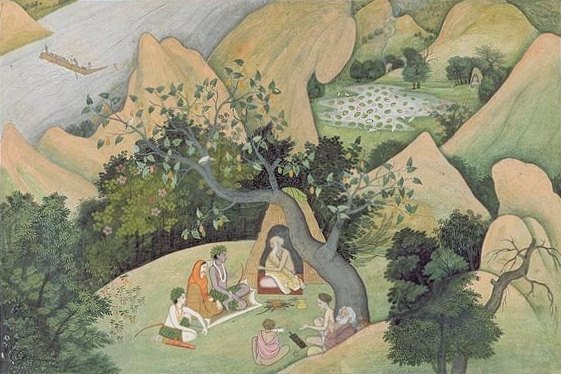Shanthi Mantra verses, like the ones shown at the end of the article Lava Kusha, have been recited by the holy sages and learned persons when the kings advanced during the peaceful processions.
वसिष्टो वामदेवस्च जाबालिस्च दृढव्रतः । अग्रतः प्रययुः सर्वे मन्त्रिणो मंत्रपूजिताः ॥

In order to dissuade Rama, Sita and Lakshmana at Chitrakoota and to canvass them to return to Ayodhya, the procession of Bharata commenced with a team consisting of great sage Vasishta, Vamadeva, strong devotees like Jabali, after worshipping appropriately, in search of them. All of them had been seen in Ramayana praising God Rama. But when one reads the story of Jabali Rishi, one may think him as an Atheist. Without knowing Sanskrit, some readers had accused him.
Anyhow, Rama was determined to stay in the forests for the fourteen years, as per his promise to his father. Prince Bharata entrusted Jabali Rishi, the risks of trying once again, in persuading Rama to return to Ayodhya, and all of them returned to Ayodhya leaving Jabali Rishi behind in the forest.
ततः शिरसि कृत्वा तु पादुके भरतस्तदा । आरुरोह रथं हृष्टः शत्रुघ्न सहितस्तदा ॥
The meaning: Then, holding the holy sandals of Rama up on his own head, Bharata had climbed his chariot, with Shatrughna, satisfactorily.
Thus, the team of Bharata had returned to Ayodhya and Jabali Rishi had remained for a day in another forest, staying in Bhimbetka, a marble cave shelter, near Bhopal, in Madhya Pradesh, a place, very near to the Narmada River. Then the name of the river was Nerbudha or Rewa and due to the slippery properties of the marble rocks of its banks, it was disliked by holy Rishis, except Jabali.
In the court of Emperor Dasharatha, Jabali had worked as a priest. He was a very pious sage and a learned scholar. He thought instead of worshipping only sandals in front of the empty throne, it would be better to worship the living Rama himself and after his task of dissuading failed, he remained in the border place of the countries, at Jabalpur performing penance himself, and frequently visiting God Rama as and when Rama invited him for conducting the rituals in respect of late Dasharatha, as long as they stayed in Chitrakoota or Panchavati. The name, Jabalpur is assigned to this area after the holy Jabali Rishi had lived here, nearest to the Bheda Ghat area.
On the day of the death anniversary, after the completion of homage paying rituals of his father, Lakshmana had arranged a marble bench for Rama and Sita to sit, together on the banks of Narmada River. Then, Jabali Rishi used to worship Sita and Rama together. This worship is called as Dampati Pooja (Husband and wife sitting together as Lakshminarayana). After blessings and wishing better prospects, till next year meeting, they had departed. In order to avoid the disturbances of forest demons, these days are kept as secret days, of the exile period of Rama, and the same descriptions are available in many Puranas.
The marble of Jabalpur and the water of Narmada River are holy and famous. When the Mughal king Shahjahan intended to build Tajmahal, he had collected the marble stones of good qualities from many places. The marble stones available near Bheda Ghat are erosion less and corrosion less, and majority of the marble stone required for the building of Tajmahal had been procured from this site.
Initially, Rama stayed in Chitrakoota and then the demon Khara was patrolling that area in hunting for the flesh of human beings. Later, his son, the demon Makaraksha had been crowned in the Dandakaranya forest area. Then Rama shifted to Panchavati, south of Jabalpur area. But Jabali Rishi could cross the river easily since the breadth of the river is least in Bheda Ghat area and he could reach Rama without the help of any boatman.
On the second day of the departure of Bharata to Ayodhya, Jabali Rishi approached Rama starting from the cave. Rama greeted him with reverence. Jabali started his speech with many tactics. He told Rama that his father had expired after conducting many Ashwamedha yagas and there would be no profit for anybody if Rama stayed in forest. The throne had waited for his presence. When the person had no more existed, there would be no value for his voice, hence it would be better to forget the vow of fourteen years exile and it would be better for Rama to return to Ayodhya. But Rama said as follows:
सत्यमेवेश्वरो लोके सत्ये धर्म सदाश्रितः । सत्यमूलानि सर्वाणि सत्यान्नास्ति परं पदं ॥
The meaning of verse as pronounced by Rama: Truth itself is the God in this world. The Dharma exists always in truth. Truth is the basic reason for all. There is no other word other than truth. He emphasized the value of his words uttered in front of his mothers and would stay in forests to fulfill it.
Jabali discussed: In this world, land is to be inherited by man. One must get name and fame. One should succeed in his tasks and get wealth. Money would make life more meaningful and money could not be earned by staying in forests. Nobody would follow Rama, having no money with him, if stayed in forests. But Rama could not alter from his determinations and said as follows:
भूमिः कीर्तिर्यशो लक्ष्मीःपुरुष प्रार्थयंति हि । सत्यं समनुवर्तन्ते सत्यमेव भजेत् तः ॥
The meaning of the verse as pronounced by Rama: Certainly man is praying to inherit land, to get good praise worthy name, to achieve success in his tasks, to get money or blessings of God Lakshmi, but all these ideals are equally following truth, and thus only truth is ultimately worshipped by him.
Jabali Rishi felt exhausted and Rama continued:
कर्मभूमिमिमां प्राप्य कर्तव्यं कर्म यच्छुभं । अग्निर्वायुश्च सोमश्च कर्मणां फलभागिनः ॥
The meaning of the verse as pronounced by Rama: This is the world, of works. After getting the birth here, one should do good works. In the rituals also, the angels of fire, air and the moon are all share takers of the results of our good works. So Rama explained the law of Karma and results to overtake the arguments of Jabali Rishi. Finally, he reminded of the rituals on behalf of fathers, of whom we wish them to be living in heaven happily. As per protocol, for Rama being a Prince of Ayodhya and Jabali being a servant priest, practicing from the time of his father Dasharatha’s rule, Rama prostrated before Jabali and the issue was considered as closed.
The death anniversary homage-paying rituals on behalf of late king Dasharatha had been performed using the water procured from the River Narmada and Jabali Rishi had assisted Rama to perform the same, for twelve times, during the twelve years of the exile of Rama. Previously, the initial rituals on his part were finished on the banks of River Ganga, near Bharadwaj Ashram and after the Rama Ravana war, while returning back to Ayodhya, by stopping the Pushpak Viman at Bharadwaj Ashram, the rituals for the fourteenth year also, was again performed on the banks of River Ganga using its holy water. Thus Rama had showed he was faithful to his father and loyal to the truth, and punctually performed his Dharma.
Jabali Rishi was not an atheist, but he was discharging the task entrusted upon him.
It is humbly prayed for the blessings of God Rama upon us.
Next post, being of the listing of names of Rivers,Temples and forests of Ramayana, may not be missed. Atri, Anusuya and Ahalya of Ramayana would be presented separately in another article. Readers may provide feedback and share this story with friends and family.

Leave a Reply